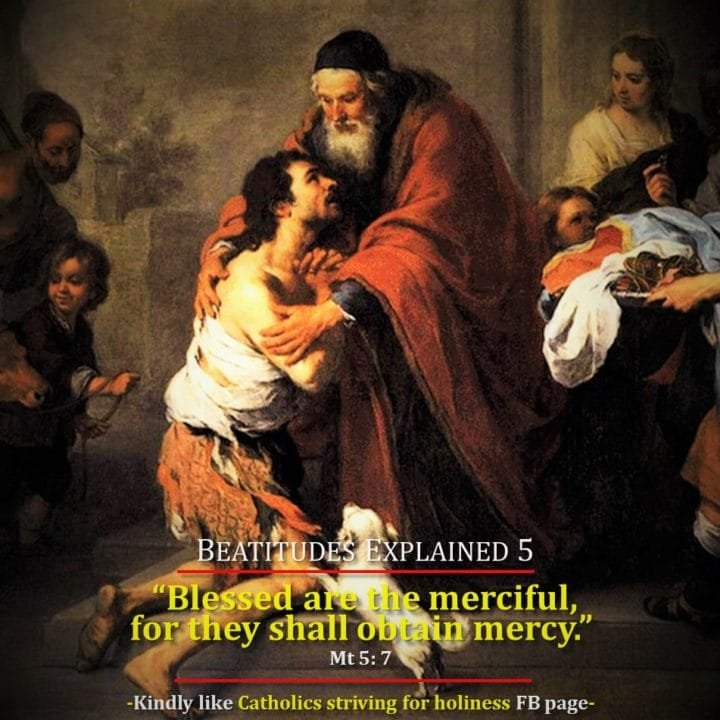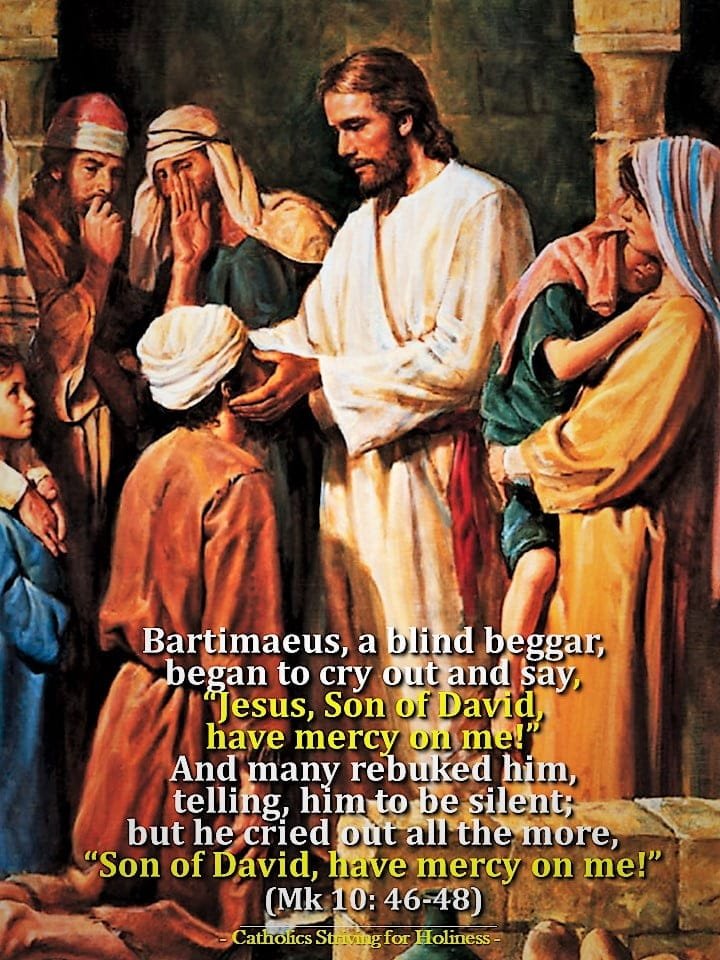BEATITUDES EXPLAINED 5: BLESSED ARE THE MERCIFUL.
WHAT IS MERCY?
“Blessed are the merciful, for they will receive mercy.”

“Mercy is not just a matter of giving alms to the poor but also OF BEING UNDERSTANDING towards other people’s defects, OVERLOOKING them, HELPING them cope with them and LOVING them despite whatever defects they may have”, but above all, FORGIVING THEM as God forgives us. “Being merciful also means REJOICING and SUFFERING with other people (Commentary to the Gospel of St. Matthew, Navarre Bible, Sceptre Press),” doing what is within our reach to relieve their suffering thourgh the works of mercy.
Pope Francis, in his Apostolic Exhortation, Gaudete et exultate, comments:
80. Mercy has two aspects. It involves giving, helping and serving others, but it also includes forgiveness and understanding. Matthew sums it up in one golden rule: “In everything, do to others as you would have them do to you” (7:12). The Catechism reminds us that this law is to be applied “in every case”,[71]especially when we are “confronted by situations that make moral judgments less assured and decision difficult”.[72]
81. Giving and forgiving means reproducing in our lives some small measure of God’s perfection, which gives and forgives superabundantly. For this reason, in the Gospel of Luke we do not hear the words, “Be perfect” (Mt 5:48), but rather, “Be merciful, even as your Father is merciful. Judge not, and you will not be judged; condemn not, and you will not be condemned; forgive, and you will be forgiven; give, and it will be given to you” (6:36-38). Luke then adds something not to be overlooked: “The measure you give will be the measure you get back” (6:38). The yardstick we use for understanding and forgiving others will measure the forgiveness we receive. The yardstick we use for giving will measure what we receive. We should never forget this.
82. Jesus does not say, “Blessed are those who plot revenge”. He calls “blessed” those who forgive and do so “seventy times seven” (Mt 18:22). We need to think of ourselves as an army of the forgiven. All of us have been looked upon with divine compassion. If we approach the Lord with sincerity and listen carefully, there may well be times when we hear his reproach: “Should not you have had mercy on your fellow servant, as I had mercy on you?” (Mt 18:33).
Seeing and acting with mercy: that is holiness.
In Misericordiae vultus n. 2, Pope Francis wrote:
“Mercy: the word reveals the very mystery of the Most Holy Trinity. Mercy: the ultimate and supreme act by which God comes to meet us. Mercy: the fundamental law that dwells in the heart of every person who looks sincerely into the eyes of his brothers and sisters on the path of life. Mercy: the bridge that connects God and man, opening our hearts to the hope of being loved forever despite our sinfulness.”
The measure of Christ on the Cross is a love without measure, a forgiveness that embraces everyone. The Lord’s demand is very high, and we are called to also imitate him in this Love for all men.
Sometimes, we can think that imperfections and sins, personal and others, constitute an insurmountable barrier to assault the heart of God. However, as Saint Francis de Sales reminds us, there is no doubt that “God hates deficiencies, because they are deficiencies. But on the other hand, in a certain sense, he likes deficiencies insofar as they give him the opportunity to show his mercy and we the opportunity to become humble, and understand and share the deficiencies of our neighbor»[Cfr. St. Francis de Sales, cited by John Paul I, General Audience, 20 Sept 1978.].
PHOTO CREDIT: Bartolomé Esteban Murillo (painter), El hijo pródigo.
Stay updated: subscribe by email for free TO OUR NEW WEBSITE www.catholicsstrivingforholiness.org (PUT YOUR EMAIL IN THE SUBSCRIBE WIDGET).
We are also in www.fb.com/Catholicsstrivingforholiness. Kindly help more people in their Christian life by liking our page and inviting your family, friends and relatives to do so as well. Thanks in advance and God bless you and your loved ones! Fr. Rolly Arjonillo

